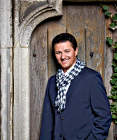ORFEO International – Reviews
Important Releases Briefly Introduced
July 2010
ORFEO 1 CD C 814 101 A
Piotr Beczala: Slavic Opera Arias
In both the Italian and the French repertoires, Piotr Beczala has already enjoyed success among public and press alike at all the great opera houses of the world. 
C 814 101 AThis Polish tenor also excels in the Slavic repertoire, though international trends in programming have meant that this phenomenon has received far less recognition than he deserves. Exceptions that prove the rule have been Beczalals successes as the Prince in Dvorák’s Rusalka at the Salzburg Festival and as Lenski in Tchaikovsky’s Eugene Onegin at the Met in New York, the Royal Opera House Covent Garden and elsewhere. Beczala’s recital here naturally includes highlights from the aforementioned works, but he also offers proof of the rich possibilities – hitherto largely ignored – that this repertoire offers for a tenor to display both vocal grace and melancholy. He is accompanied by the Polish Radio Symphony Orchestra from Warsaw under the direction of its chief conductor, Lukasz Borowicz. 
Piotr Beczala
Foto: Johannes IfkovitsIt was in Warsaw that many of the operas were premièred of which Beczala offers us highlights here – such as Straszny Dwór (“The Haunted Manor“), Flis (“The Raftsman“) and Halka by Stanislaw Moniuszko. He was one of the driving forces behind the patriotic opera aesthetic of the newly founded national states in 19th century Europe, an aesthetic not just restricted to Poland. These three operas offer intensely atmospheric scenes of reminiscence and contemplation for their tenor protagonists, and they are joined here by the later, almost veristic operas Janek by Wladislaw Zelenski and Legenda Baltyku (“The Baltic legend“) by Feliks Nowowiejski. Such fiery declarations of love as these are naturally found in equal diversity in the Russian and Czech repertoires, such as in Smetana’s celebrated Bartered Bride and Borodin’s Prince Igor. The latter has enjoyed better times in the popularity stakes in the west, so it is fitting that Beczala here reminds us once more of the qualities of Vladimir’s romance from it. Vaudémont’s aria from Tchaikovsky’s Jolanthe is a similar case, though the work’s rarity has not prevented Piotr Beczala from being able to play the role on stage already. A more dramatic note is heard in Herman’s arioso from the gambling scene in Pique Dame. The musical spectrum is here completed by examples of exoticism and local colour with excerpts from Rimsky-Korsakov’s Sadko (in two different orchestrations!) and Majskaja noè (“The May Night“) and from Rachmaninov’s Aleko and Arensky’s Raphael (two representatives of the next generation). This is a solo programme from one of the great tenors of our time that is as varied as it is rich in discoveries.
top |